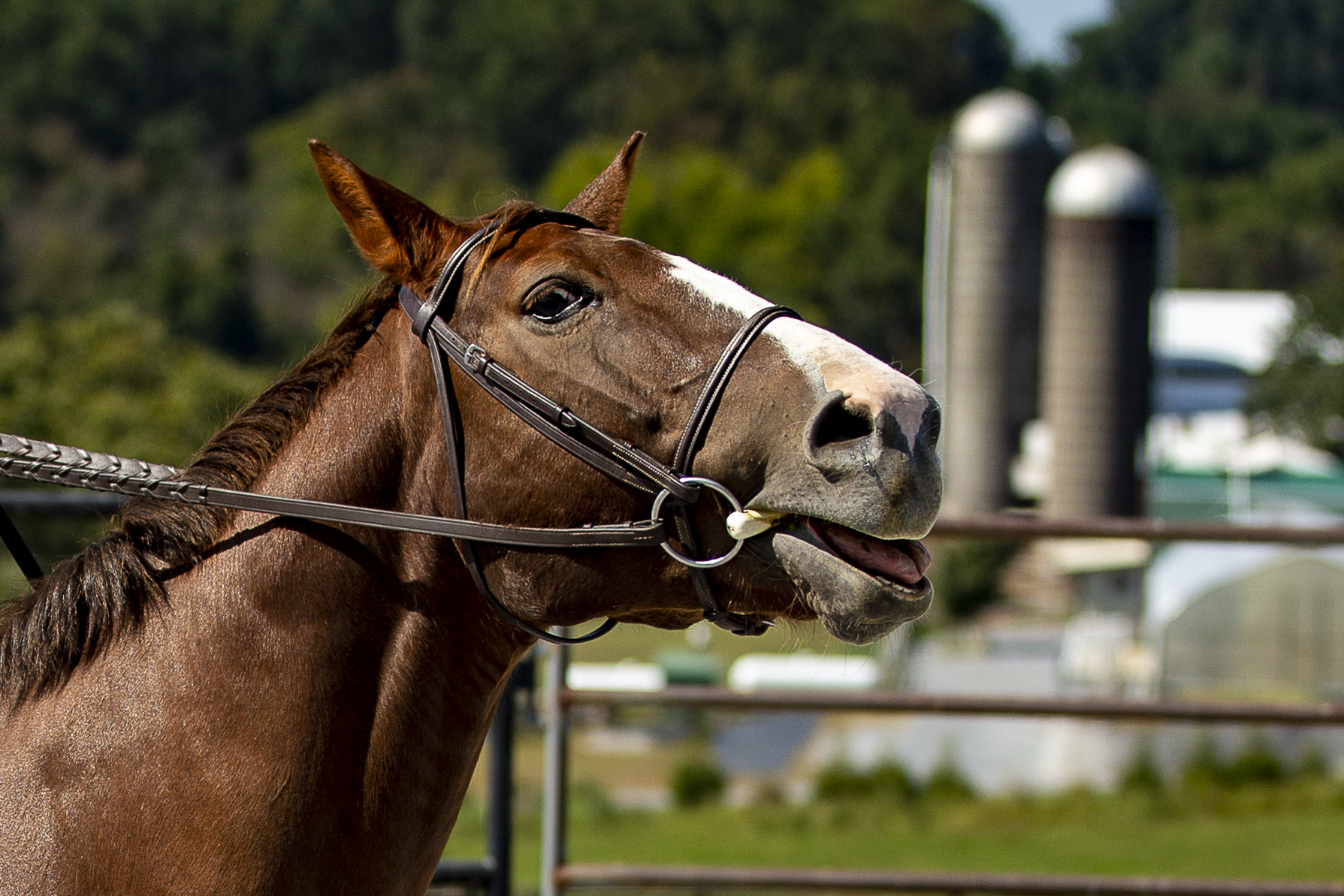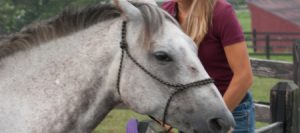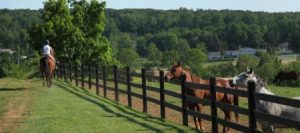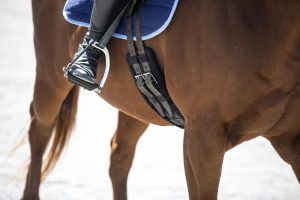This is one of those grey areas for horse owners. What do you do when your horse threatens to kick or pins his ears and nips at you? What if, during training, you feel that you are already using too much pressure, but he isn’t even moving! Or what if he becomes scared of you or won’t like you if you get more aggressive?
The answer to this question is not a simple one, as every horse and every person is different. How much pressure you think you are using is very subjective; what seems like a lot to one person may not to another. The same is true with horses. To an untrained thoroughbred who is hot and flighty, even a small movement or a little pressure will put him into action to get away. But a large draft horse may just stand there, hardly noticing that you are swinging your rope feverishly at him, or pressing on his side to move him over. So to begin to examine this question, let’s start by working through an example.
You are training your horse to walk forward as you point where you want him to go with the lead rope and tap his haunches with the stick. You start out by moving your hand forward to point and send him out. Since you got no response you begin tapping him lightly with your stick. Now he raises his head slightly and his ears go back–he is telling you, “I don’t like this, please stop.” You respond by keeping the same tapping pressure and rythym. You are telling him, “I will stop when you do what I want, when you move forward.” Next, your horse begins to back up and swing his hips to the side. He is moving and looking for the right answer, so you respond by maintaining the same pressure to tell him “keep trying, that’s not the answer I am looking for.” He finally happens to take one step forward. Stop tapping immediately and praise him–he got the “right answer.”
Next scenario: you are still training your horse to walk forward, but today he is in a lazy mood. You ask him to move forward by pointing. He does nothing, so you start tapping. He ignores the tapping and appears to be dozing off. This time you need to increase the pressure until the point where he begins moving and searching for the right answer again, then maintain that same pressure until he does what you want. Then, of course, release immediately.
Last scenario: still training to walk forward, as you begin your tapping, your horse raises his head, pins his ears, and cow kicks in your direction. Now what? Your horse has just threatened you and said, “I refuse to move out of your way or do what you want, stop bothering me or I will kick you.” Any time that your horse threatens you with biting, kicking, or running into your space, he needs to know that you do not allow this behavior and there will be consequences. In this case, abruptly pull his head towards you and make him back, spin in a circle, take his haunches away, anything to tell him, “I am the leader, you will move away from ME.” After a few seconds of aggressive correction, relax and go right back to what you were working on. Correcting your horse for this type of behavior needs to be aggressive and fast. If you back off, do not respond, or just yell at him, your horse will have learned that kicking makes you leave him alone. If you drag out the correction, he will forget what happened that he is being corrected for and will become scared.
In conclusion, always start off asking your horse softly with little to no pressure. If he ignores your request, increase the pressure until he is searching for what you want. If he becomes threatening or aggressive, correct the behavior quickly and aggressively then move on. Remember that a spoiled horse is a dangerous horse.














5 Responses
I am working on unspoiling one of my horses. He’s learned that running into my space gets me out of the round pen and he can start grazing or whatever. He learned this years ago. Ever since then, I’ve been pretty frightened of asking him to do anything I think he might not like. I’m trying so hard to overcome this fear of him, and show him who is the leader. I get so frustrated at times because now he just ignores me because he knows I won’t push him for fear he will explode. I guess I will have to try this again and show him who the boss is. Hoping I can… for his sake and mine.
Hi Miche, This is a tough one, because what happens is horses learn to burst old behaviors when a behavior that worked for them in the past no longer does. For example, if your horse is used to running towards you in order to get what he wants (release of pressure or being left alone) then when you start to stand up to him, he is likely to burst that behavior of running into you, meaning he will try it longer/ harder/ more aggressively because it worked in the past. If the burst does not work then the horse will usually give up the old behavior and offer a new one (like moving away from you) which you can then reinforce by dropping the pressure. So I know this may not be very encouraging, but think of it as how can you set yourself up to be able to keep asking what you need to ask (keep pressure on for example) so your horse is not reinforced by his behavior burst. I find it easier to think of the issue in these terms rather than a leadership struggle. If we think too much in terms of a leadership struggle I find we are not as likely to reinforce (by dropping pressure) as quickly as we should. It is important to be smart about your skills and abilities and sometimes this means having a trainer come in to work through some of these behaviors. Hope this helps!
Thanks, Callie. You are right. I need to get someone out here to help me with a few things. I’m having issues in the saddle as well as on the ground. Others can get him to be respectful in the roundpen. I’ve seen it. It’s weird though, at feeding time, he knows to get away from the tire feeder, I point my finger at his breast, and he backs up and moves away until I cluck at him to come back. I’ve taught him to do this. He used to grab at the hay until he caught my finger one time. Then I vowed he would never come near his food again until I said it was okay. So now, he’ll keep his distance. So why can’t I do this in the round pen? Why can’t I get respect in the saddle? Why do I have fear there and not when I’m feeding him? I’ve trained him to come to me when I whistle, to flex, pivot, to stand still at the mounting block, to stop when I say stop, drop his head for his halter or mask, and so much more. However, there is this disrespect when I ask him to move off in the round pen and give me some life, and when I ask him to move out in saddle I get too much energy especially with his head. We have some things to work through. Maybe a trainer this summer. Thanks!
Hi Miche,
Just a few more thoughts – in the roundpen, consider what it is you are using the round pen for, what I mean is perhaps your horse is just bored with moving about in the round pen and his lack of energy in there isn’t him not respecting you, it’s just because he doesn’t see the point of it. I know that may sound a bit strange, but I’ve come to learn that everything I do with the horses works better when I have a reason behind it. If I do something just because I think I should be doing it, it often doesn’t work out as well.
I would also be kind to yourself regarding the riding – its only natural to have more fear perched on top of a horse that is acting up then when you are on the ground feeding them! It sounds as though you have done a lot of great work with your horse, so I would keep working at it, if you have the chance to get someone to watch your riding (or even make a video of your riding) that may be very helpful – it is often much easier to see what you are doing when you aren’t in the moment. Callie
🙂 Thank you! I will do that this weekend. Blessings to you, Callie.